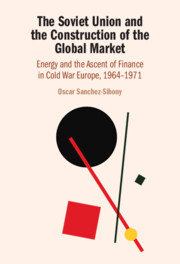 The Soviet Union and the Construction of the Global Market
The Soviet Union and the Construction of the Global Market Bretton Woods and the Financial Fix
Published online by Cambridge University Press: 31 August 2023
The Soviets deployed a performative politics of the market everywhere they went, but they used with particular insistence in Great Britain. The British economy had performed well in the postwar period, but its industry was losing out to competitors in continental Europe and Japan. This was something the Soviets liked to point out, and often. But Great Britain had a unique advantage: a still international currency with relatively deep captial markets. It is in this ambit that the British sought, in 1964, a competitive edge over its allies for Soviet business. In order to counter rising competition – and against strong American pressure – the British offered to liberalize parts of its national economy and to offer better and temporally longer finance for Soviet purchases of British industrial products. In doing so, they breached financing practices from the 1930s. The Soviets then used these new terms to pressure other European countries into better financial arrangements for their deal-making. The promotion of market practices of competition, the Soviets understood, could be achieved through financial competition in the absence of integrated global markets for industrial commodities. British financiers would be the bearers of the political transformation the Soviets sought and strove for in the world economy.
To save this book to your Kindle, first ensure [email protected] is added to your Approved Personal Document E-mail List under your Personal Document Settings on the Manage Your Content and Devices page of your Amazon account. Then enter the ‘name’ part of your Kindle email address below. Find out more about saving to your Kindle.
Note you can select to save to either the @free.kindle.com or @kindle.com variations. ‘@free.kindle.com’ emails are free but can only be saved to your device when it is connected to wi-fi. ‘@kindle.com’ emails can be delivered even when you are not connected to wi-fi, but note that service fees apply.
Find out more about the Kindle Personal Document Service.
To save content items to your account, please confirm that you agree to abide by our usage policies. If this is the first time you use this feature, you will be asked to authorise Cambridge Core to connect with your account. Find out more about saving content to Dropbox.
To save content items to your account, please confirm that you agree to abide by our usage policies. If this is the first time you use this feature, you will be asked to authorise Cambridge Core to connect with your account. Find out more about saving content to Google Drive.